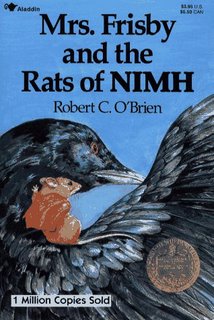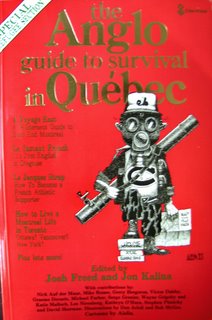 Yup, following on the coattails of Olman, who was influenced by Jarrett’s review. With 2 co-habitating 50-bookers, this kind of book-sharing was bound to happen!
Yup, following on the coattails of Olman, who was influenced by Jarrett’s review. With 2 co-habitating 50-bookers, this kind of book-sharing was bound to happen!The book truly delivered – I was instantly caught up in the story & adventure, and read it all up in a weekend. Although the story itself was deceptively simple, I appreciated its deep philosophical themes, which of course, helped to make it an enduring children’s novel. And the adventures! The NIMH backstory was the best part (as in the film), but I especially loved how the rats discover the Boniface mansion and the toy tinker.
As with truly excellent animal stories, there are the recognizable themes of human-animal relationships, ruminations on how different species and/or groups perceive one another, how that makes us think of human society, and how that makes us wonder and hopefully respect the sentiency of other creatures. Yeah, there’s a bit of that anthropomorphizing thing going on. But how else would one deal with the usual “human” themes of love, sacrifice, friendship, honour, courage, knowledge and wisdom?
** spoilers ahead **
Here's a crazy theory of mine. On another level, the Rats of Nimh were like a spiritual metaphor and a warning for humans, especially North Americans in general. The rats were given the gifts of intelligence and longevity by a superior species. They proceed to acquire all of human knowledge and history, but with the potential “blank slate” of a newly created sentient life-form.
For instance, in his quest for knowledge, Nicodemus takes to heart the Rat Race story he read in the library of the Boniface mansion. The story teaches him the dangers that can befall a society in which the lifestyle of its citizens becomes too easy and complicit. As civilization advances, it also gets spoiled by the comforts of convenience and technological progress. Eventually, the rats themselves reach a stage where they can no longer rely on humans. They make a democratic decision to forsake their worldly comforts and possessions in order to take the next step of pure self-reliance (and enlightenment). The rat utopia in Thorn Hill is what human civilization should be striving for.
My only small and very trivial beef with the book is the lack of female rats of Nimh. Surely, out of the 20 rats that were in Group A, some of them would have been female?
But man, when Olman finds the movie-version of the book, you can bet yer bottom dollar I’m gonna be watching it again!
